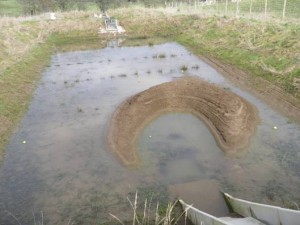MOPS2 working with EdenDTC
MOPS2 constructed wetlands for mitigation of diffuse pollution: Annual sediment survey is underway
MOPS2 researchers work closely with the EdenDTC team, as most of the constructed wetlands are based in the River Eden catchment and both projects are funded by Defra. Data gathered by the DTC team are useful to MOPS2 and research findings from MOPS2 are highly relevant to the EdenDTC project, particularly in the future when various mitigation options will be trialled in the catchment.

At the MOPS2 constructed wetlands in the Eden catchment, Cumbria, sediment sampling is currently underway, to estimate the sediment and nutrient retention in the wetlands from Autumn 2010 to Autumn 2011. Sediment depths will be measured by lifting sediment traps placed in Autumn 2010, and by surveying methods. Samples will be dried and weighed to estimate sediment quantities and then analysed for nutrient concentrations. Data will be compared with sediment and nutrient quantities trapped over the previous year.
The MOPS2 project (Mitigation Options for Phosphorus and Sediment) is a collaborative research project, funded by Defra, involving four project partners: Lancaster University, ADAS, University of Reading and the Allerton Project. Part of MOPS2 (2008-2013) focuses on the viability and effectiveness of constructed wetlands for trapping sediment and nutrients lost from agricultural land. Ten experimental wetlands in have been built in Cumbria and Leicestershire, covering a range of soil types and runoff sources (including overland flow, drain and ditch flow). In Cumbria, the wetlands are located on three farms in the River Eden catchment:
- Crosby Ravensworth (3 wetlands)
- Plumpton (3 wetlands)
- Newton Rigg (1 wetland)
For further information on MOPS2, please visit our website: http://www.research.lancs.ac.uk/portal/en/projects/mops-2(5ee3a708-0089-4804-aaa2-a7b500b961d2).html